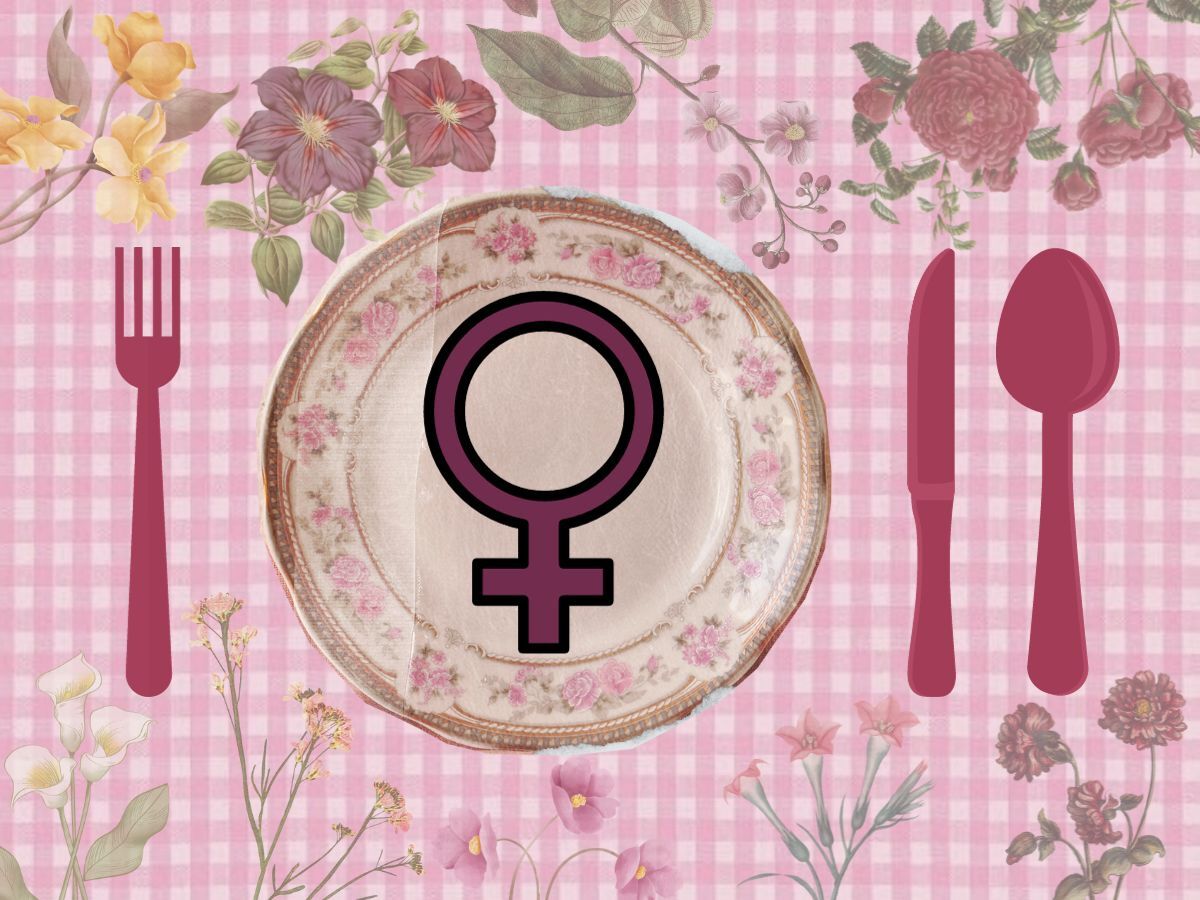Even if you’re not as chronically online as I am, chances are you’ve heard about “girl dinner” or “girl math,” both trending phenomena taking social media by storm. While they are entertaining and relatable, they share in a backhanded practice of genderization, which contradicts years of feminist work to establish a culture of equality between sexes.
“Girl dinner,” as defined by TikTok creator Alana Laverty, who first coined the phrase, is a simple meal that does not require much preparation and prioritizes the fulfillment of a craving rather than the satisfaction of nutritious needs. Think of a snack plate prepared by one person and eaten for their own enjoyment as a substitute for a traditional meal.
If you’ve heard about girl dinner, then maybe you’ve also heard about “girl math,” a term going viral online which is used to represent logically incoherent justifications for certain spending habits. The idea that cash is “free money,” since using cash avoids a withdrawal on your bank account, is a popular example of “girl math” used to justify self-indulgent purchases made with physical money.
Why is “girl” such a celebrated adjective for a universal experience?
“Hot girl walk” is another gendered buzzword prevalent on social media. A “hot girl walk” is a restorative practice during which a participant walks through nature while restricting their thoughts to only three things: their blessings in life, their future goals and their own beauty.
The method is meant to keep “hot girl walk” practitioners from viewing themselves in relation to others, instead encouraging them to build up their own self-confidence. There’s a strict ban on any thoughts about outside interactions and romantic entanglements and a laser focus on building a positive mindset by oneself.
I don’t oppose the general idea of “girl dinner”; I often participate in the practice of the unconventionally put-together meal myself, as do a lot of people I know across gender identities. As for “girl math,” I’ve also enjoyed the feeling of discovering some forgotten cash in my wallet and using it to buy myself a treat while avoiding a charge on my bank account. Additionally, I’m a huge proponent of walks as a panacea to any sort of mental stress. It’s not the concepts themselves that I oppose, but the general acceptance — and acclaim — of the “girl” label attached to them. Why is “girl” such a celebrated adjective for a universal experience?
It could be argued that the popularization of “girl” activities is an effort to resist sexism, to reclaim the identity of femininity via focusing on self-reflective and beneficial activities — “girl dinner” is dinner for oneself, as opposed to the traditional role of the woman being the caretaker and chef for the whole family; “girl math” allows women to claim financial freedom in a society where they were not legally allowed to open bank accounts until 1974; “hot girl walks” are the reappropriation of beauty from the spectator to the individual, allowing women to deem themselves as “hot” rather than depend on outside approval, typically from the male gaze.
I agree with the effort to reshape the idea of femininity into something that is not defined through a masculine gaze. But there’s something about someone proclaiming my meal a “girl dinner” that ticks me off. There’s something about a friend lauding my “hot girl walk” — in reality, just a mopey solo wander through Central Park — that bothers me.
I have been a feminist since I first learned what the term meant, and I’m proud of that, but not everything about my life centers around feminism or my identity as a woman. Yes, I am a woman, but when I enjoy an unconventional dinner, that has nothing to do with my feminism. Paying in cash has nothing to do with the fact that I use she/her pronouns. I reject the idea that every single action of mine is irrevocably attached to my femininity, because it reduces me to being “just a girl.”
It’s good to celebrate those who identify as women and girls, but it’s also important to give them flexibility in how they define themselves as such.
While “girl dinner” is merely annoying, “girl math” is arguably more insidious in its sexism. Although the feeling of using cash to justify a purchase is understandable, it is definitely not mathematically sound in any regard. By labeling the thought process as “girl math,” it is essentially correlating irrationality with femininity — the fact that this “girl math” typically applies to situations having to do with shopping or beauty is also a pejoratively narrow definition of femininity.
Defenders of “girl math” would say that it is not actually irrational; Imani Barbarin, a public speaker and disability rights activist, wrote in a post on X, formerly known as Twitter, that “Girl math is essentially the recognition that time, convenience, and money are interchangeable currencies.” Even if that is the case, this trend should not be categorized as a “girl” activity. That would only be justified if it revealed something unique to the experience of femininity.
The popularity of gendered jokes made by young people on social media is paradoxical, as Generation Z is known for being the most experimental with gender identity. The World Health Organization defines gender as a social construct not related to biological sex, and today’s youth have made an effort to treat it as such. Radical experimentation with gender is more common and accepted by younger generations: In a 2022 survey, one in five U.S. adults state that they know someone who identifies as nonbinary. Generation Z is the age group most likely to agree with the statement that there are more than two genders.
Amid the rise in gender non-conformity and a growing culture of women’s rights, the stage is set for society to deemphasize gender identity as a predetermining factor in someone’s identity. More Americans are embracing the idea of gender neutrality: Gender neutral bathrooms, for example, are a growing phenomenon illustrating the decentralization of the gender binary in societal institutions. Gender-inclusive language is a growing linguistic movement pushing back on inanely gendered terms. “Girl dinner” and “girl math” undermine this positive shift towards gender neutrality.
My intention in calling out these terms is not to gatekeep femininity or to pedantically ruin a funny joke. Redefining womanhood in terms outside of what has been typically ascribed to femininity can be useful and enlightening, allowing women to reclaim their feminine identities from misogynistic experiences. It’s good to celebrate those who identify as women and girls, but it’s also important to give them flexibility in how they define themselves as such. It’s impossible to ascribe an established definition of femininity because to do so would be to replace one oppressive framework with another. By assigning the narrow definition of “girl” to concepts irrelevant to gender identity, women are further pinholed in their identity, ruining the liberatory intent of feminism.
The popularization of terms like “girl math” and “girl dinner” call to mind Audre Lorde’s declaration that, “We find ourselves having to repeat and relearn the same old lessons over and over … who would have believed that once again our daughters are allowing their bodies to be hampered and purgatoried by girdles and high heels and hobble skirts?” Great steps have been taken to establish that the social construct of gender identity is mostly irrelevant to human life except in the instances we let it have power over us — we shouldn’t abet its power by incessantly attaching gendered labels to inane experiences in an attempt to garner social media clout.


